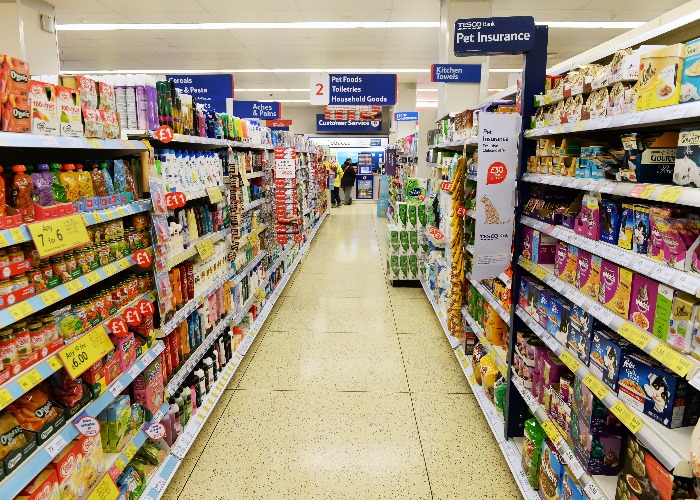Tesco Better Baskets promotion: supermarket cuts price on healthy food items

New scheme cuts the price of healthy food, as well as items in environmentally-friendly packaging, but only for Tesco Clubcard members.
Supermarket giant Tesco has launched a new scheme aimed at making it cheaper for shoppers to purchase healthier food.
According to the retailer, the Better Baskets range is designed to help people feel better about the food they buy and the packaging it comes in, with lower prices on offer.
Around 200 products are included in the scheme, which covers products like high fibre cereals and snacks, plant-based options, low- and no-alcohol drinks and treats with under 100 calories.
Better Baskets is exclusively for members of the store’s Clubcard loyalty scheme.
Deals include a third off the price of items in Tesco’s ‘meat & veg’ range (which all contain 30% veg but cook like meat), while there are three-for-two deals available on fruit and nut snack packs, as well as price cuts of up to 37% on healthy cereals.
Interestingly, there is an eco-friendly bent to the scheme too, with prices reduced on environmentally-friendly cleaning products, as well as those with reduced packaging.
Tesco looking to highlight its healthy credentials
It's worth noting the context in which this healthy food promotion was announced.
The Government recently announced it would delay the impending supermarket ban on multibuy deals for junk food by a year in response to the cost of living crisis that has seen food prices, amongst many other things, soar in recent months.
However, Tesco was the only supermarket to say it would push ahead with the multibuy ban anyway.
As reported in The Grocer, the supermarket recently announced wanted to ensure 65% of its sales come from healthy food by 2025.
It's clear Tesco's latest promotion is another step towards achieving that goal while highlighting its healthy eating credentials.
I can’t afford to eat healthily
The nation’s ability to cook healthy food cheaply has been the subject of heated debate of late.
Lee Anderson, the Conservative MP for Ashfield, sparked a furious row when he suggested that the main issue driving food poverty is a lack of cooking and budgeting skills.
Anderson suggested that healthy and nutritious meals can be cooked for as little as 30p a head, though his comments were slammed by food and poverty campaigners as patronising and out of touch.
Campaigners have long argued that less nutritious food is often cheaper to purchase, and that difference in price becomes all the more compelling in the cost of living crisis.
The rising cost of food
There’s no avoiding the fact that we are in the middle of a period of incredibly high inflation, with the latest figures from the Office for National Statistics showing that the consumer prices index (CPI) measurement has now hit an incredible 9%.
However, food in particular is an area where many of us are seeing stark increases in the prices we pay. The latest data from Kantar WorldPanel found that like-for-like grocery inflation hit 5.9% in April, its highest level since December 2011.
In pure cash terms, that means households having to pay an average of £271 extra a year on food. Crucially, the price hikes are taking place on food essentials ‒ the stuff we simply can’t go without ‒ rather than the luxury items that sensible shoppers are cutting back on.
Shifting where we shop
The Kantar data is also particularly eye-opening when it comes to where we are shopping. It found that over the 12 weeks to 18 April, sales at Aldi jumped by 4.2%, while sales at Lidl were up by 4%.
In total more than one million extra shoppers visited the two deep discounters over the 12 weeks up to 17th April compared to the same period the year before. That shows an awful lot of households have determined that switching where they shop is the best way to trim their costs.
It also demonstrates the incredible growth in importance of these budget stores.
They now have record market shares ‒ 8.8% for Aldi and 6.6% for Lidl. Between them, that’s 15.4% of the market, compared to 5.5% a decade ago.
Slashing prices
The big supermarkets are well aware of this obviously, and it’s precisely this flight to the deep discounters that is driving the various promotions announced in recent times.
Not only have Tesco and Sainsbury’s implemented price matching schemes with Aldi, we’ve also seen Asda revamping its own brand range and introducing a price matching programme with Home Bargains, as well as Morrisons confirming a host of price cuts on essential items.
The sad reality is that the cost of living crisis is not only going nowhere, but it’s actually likely to get worse in the short term.
That means potentially paying even more for our food shopping, let alone tangential costs like our energy bills ‒ you can’t cook dinner without using some level of energy, after all.
As a result, shoppers are going to face ever more testing decisions over where to shop, as well as what to buy.
Supermarkets of all shapes and sizes are therefore going to have to be a little smarter in their pricing, so that they deliver not only budget-friendly items but also goods that people will feel comfortable purchasing.
Comments
Be the first to comment
Do you want to comment on this article? You need to be signed in for this feature